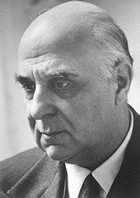
Giorgos Seferis (1900-1971)

The Nobel Prize in Literature
1963
"for his eminent lyrical writing, inspired by a deep feeling
for the Hellenic world of culture". His nobel lecture
His biography:
Giorgos Seferis was born in Smyrna, Asia Minor, in 1900. He attended school in Smyrna and finished his studies at the Gymnasium in Athens. When his family moved to Paris in 1918, Seferis studied law at the University of Paris and became interested in literature. He returned to Athens in 1925 and was admitted to the Royal Greek Ministry of Foreign Affairs in the following year. This was the beginning of a long and successful diplomatic career, during which he held posts in England (1931-1934) and Albania (1936-1938 ). During the Second World War, Seferis accompanied the Free Greek Government in exile to Crete, Egypt, South Africa, and Italy, and returned to liberated Athens in 1944. He continued to serve in the Ministry of Foreign Affairs end held diplomatic posts in Ankara (1948-1950) and London (1951-1953). He was appointed minister to Lebanon, Syria, Jordan, and Iraq (1953-1956), and was Royal Greek Ambassador to the United Kingdom from 1957 to 1961, the last post before his retirement in Athens. Seferis received many honours and prizes, among them honorary doctoral degrees from the universities of Cambridge (1960), Oxford (1964), Salonika (1964), and Princeton (1965).
His wide travels provide the backdrop and colour for much of Seferis's writing, which is filled with the themes of alienation, wandering, and death. Seferis's early poetry consists of Strophe (Turning Point), 1931, a group of rhymed Lyrics strongly influenced by the Symbolists, and E Sterna (The Cistern), 1932, conveying an image of man's most deeply felt being which lies hidden from, and ignored by, the everyday world. His mature poetry, in which one senses an awareness of the presence of the past and particularly of Greece's great past as related to her present, begins with Mythistorema (Mythistorema), 1935, a series of twenty-four short poems which translate the Odyssean myths into modern idiom. In Tetradio Gymnasmaton (Book of Exercises), 1940, Emerologio Katastromatos (Logbook I), 1940, Emerologio Katastromatos B (Logbook II), 1944, Kihle (Thrush), 1947, and Emerologio Katastromatos C (Logbook III), 1955, Seferis is preoccupied with the themes he developed in Mythistorema, using Homer's Odyssey as his symbolic source; however, in "The King of Asine" (in Logbook I), considered by many critics his finest poem, the source is a single reference in the Iliad to this all-but-forgotten king. The recent book of poetry, Tria Krypha Poiemata (Three Secret Poems), 1966, consists of twenty-eight short lyric pieces verging on the surrealistic.
In addition to poetry, Seferis has published a book of essays,
Dokimes (Essays), 1962, translations of works by T.S. Eliot, and a collection of
translations from American, English, and French poets entitled Antigrafes (Copies), 1965.
Seferis's collected poems (1924-1955) have appeared both in a Greek edition (Athens, 1965)
and in an American one with translations en face (Princeton, 1967).
FromNobel Lectures,Literature 1901-1967.
Read [in Greek] the text by Giorgos Seferis: "Yiannis Makriyannis - A Greek"
Giorgos Seferis died in 1971.
Other relevant links:
Encyclopedia.com
for Seferis
Nobel Academy on Seferis
Amazon
Books by Seferis
Alta
Vista search engine on Seferis
Princeton
Univesrity Press on Giorgos Seferis
One home page about Seferis
in.gr
search on Seferis
Hellenism.net on Seferis
Pegasus Literature Resources on
Seferis
Seferis: Our Sea Friend